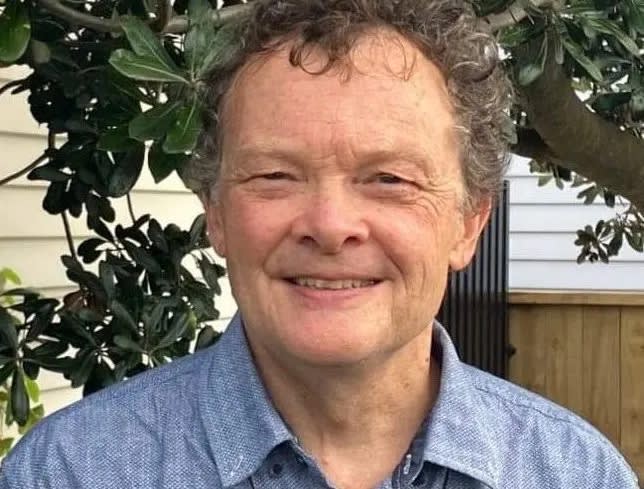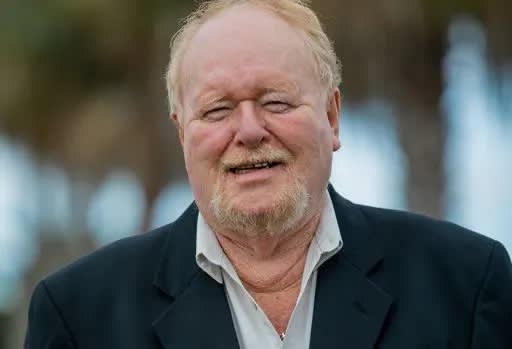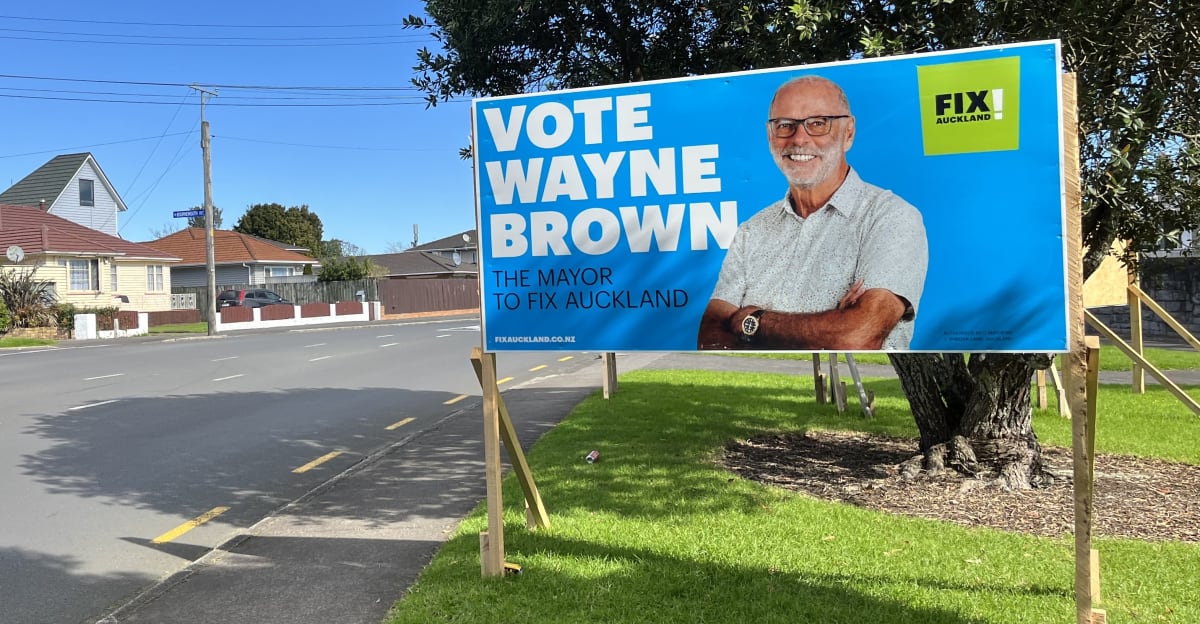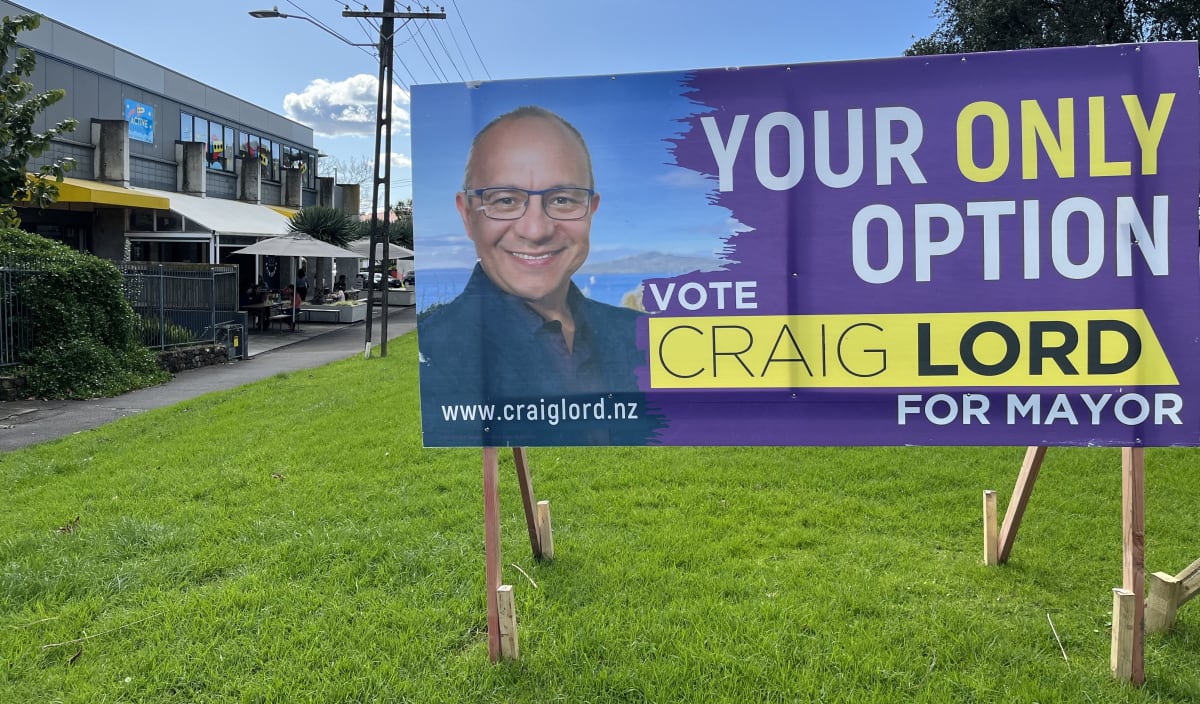
In their bid for the Auckland mayoralty, candidates have had to come up with clear transport policy while avoiding reinventing the wheel
There were almost 35 bikes parked outside the Ellen Melville Centre in downtown Auckland on Tuesday night.
It was an indication a good chunk of the audience for the mayoral debate between mayoral candidates Viv Beck and Efeso Collins pedalled their way in - perhaps not surprising for an event hosted by Bike Auckland.
Also unsurprising was the fact that transport policy, and cycling in particular, were the main focuses of the evening.
In a city choked by congestion issues and an ever-increasing urban sprawl that threatens to increase commute times year on year, transport has become a hot button issue for mayoral hopefuls on the campaign trail.
Both Beck and Collins talked about the vitriol between warring tribes of motorists and cyclists, which they said was unhelpful, instead vowing they would “bring the people along with them”.
It’s a promise that could be read as trying to please everybody when it comes to transport solutions - Collins says there needs to be more conversation with communities and Beck says she would prioritise a balanced approach.
But whether the answers lie in weaning Auckland off what Collins called a “car-dependent psyche” or Beck’s less ambitious plan to electrify bus fleets and fix potholes, it’s clear that voters are going to want clear and decisive transport policy when they reach for their ballot papers next month.
Beck and Collins were on the stage for the Bike Auckland event nominally representing the left and the right positions, but also because they were deemed to be the most bike-friendly candidates.
It’s something Animal Justice Auckland-affiliated candidate Michael Morris was confused at, as the only candidate regularly showing up to debates on his bike.
Nevertheless, Russell Brown managed to go deep into questions of bike safety, climate action and changing the way Aucklanders get around.
To round out the menu of transport policies, Newsroom canvassed some of the candidates who weren’t present to find out where they stand. But first, Beck and Collins - who drew boos and who sparked applause?
Viv Beck
The Heart of the City CEO began the evening by talking about her childhood in Amsterdam, where she remembers cycling at night through the streets as a teenager. Nowadays, she lives downtown and says walking is her favourite mode of transport.
She said cities like Paris and Amsterdam were the models she would like to see Auckland follow when it comes to transport infrastructure.
But despite these talking points, she takes a tempered view on transforming Auckland’s transport infrastructure. She said in a campaign that had taken her all over Auckland necessarily by car, she had seen many communities where rapid transit was not a cheap or easy option.
She wants to halt light rail, and instead of bringing in fares-free transport, she wants to save the money and put it back into the improvement of the existing network, getting bus lines up to the level of the Northern Express.
“I never get complaints on the Northern Express,” she said.
More ambitious policies include electrifying the bus fleet by 2030, although she qualified this by saying investment in roads will still be on the cards.
“There are lots of potholes out there.”
One policy that seems to have landed with something of a confused reaction is the call to reopen the Albert Park tunnels, which she says will link the central city and Parnell for pedestrians and cyclists.
The bike enthusiast crowd didn’t seem to know what to make of the idea - maybe a piece of concept art up on the projector would have made the difference.
One point where both Brown and the audience were pretty clearly in opposition to Beck was when she talked about reassessing cycle lanes.
“There are a lot that don’t seem to be used that much,” she said.
Members of the crowd interjected to ask her which she was talking about.
“I rarely see people on Franklin Road,” she said.
“I used it to get here tonight,” said a man in the crowd.
Beck said she was keen on expanding the cycle network, however, and promised a “well-utilised and safe cycling network” in the policy on her website.
But it has become a little unclear as to what her policy really is. Following the event, Brown tweeted about her seeming to back away from this policy.
After a little digging, he found that she had previously reposted an infographic from Mike Hosking, known for his sometimes militant stance on not increasing infrastructure for cyclists.
In the post, Hosking hailed Beck for being the only candidate to oppose more cycleways, more pedestrianisation and co-governance.
“Enough is enough,” she wrote on Facebook alongside it. “I’m standing to deliver real change to Auckland.”
So it seems that the measured response to carefully increasing the cycling and pedestrian networks she tried to sell to the crowd might have been a little different to how Beck would talk about transport in different company.
Efeso Collins
One of the cardinal policies of the Greens and Labour-endorsed candidate’s platform is fares-free public transport, which he says will save Aucklanders around $27.00 a week - more than the cost of living payments provided by Government.
He stressed the need for ambitious policy for climate reasons, as well as making cycling infrastructure safer so people had the confidence to use it, referencing an Auckland Transport survey from 2020 that found 56 percent of Aucklanders would ride if they felt safe to do so.
As a father to a nine-year old daughter, the safety aspect appeared front of mind for Collins. He compared cycle paths across the city to recent developments in Mangere and the Mangere Bridge cycle path which opened last weekend.
He said as mayor he would have robust conversations with people on both sides of the debate, and was wary of coming across too sanctimonious to people “who want to be car-reliant until they meet heaven”.
When Brown asked him why Auckland couldn't follow the example of Seville in Spain, where 80 kilometres of cycle paths were built in one election cycle, Collins said it was because the leadership needed to take people with it.
“That is what I think is Auckland’s greatest challenge… how do we say that here’s our ultimate, we want a climate-resilient society and this is how we’re going to get there,” he said. “One of the challenges I have is people are a bit tired when I talk to them and say here’s the evidence - they say I’m sick of the damn evidence because you preach to us.”
He said the right message and messenger was needed to win over people’s trust in Auckland Transport.
Collins admitted he had been “schooled” the previous week at an event at Whammy Bar also hosted by Brown, when asked where the cycling section of his transport policy was. He said it would be published early next week.
Asked what overseas model Auckland could look at to crib some ideas, Collins' first thought was his native Samoa, where bus use is prevalent and car ownership is much lower. He also said he liked the tram system of Melbourne and thought the Australian city was a legitimate north star for Auckland.
Wayne Brown
Much of the former Far North mayor’s talking points around transport have involved the amount of money and the time taken to complete projects like the City Rail Link.
He said a relaxed attitude to cost overruns had lead to increasing rates, which he promised to rein in.
Other transport projects he considered delayed and over-priced included recent cycleway upgrades to Karangahape Road, although attendees at last week’s Whammy Bar event pointed out that much of the costs he was citing were to do with street plumbing upgrades that ended up included in the bill.
Brown is also in favour of replacing the board at Auckland Transport and putting a moratorium on congestion charges until better public transport is available.
His stance in general is for Auckland to take the reins on big projects and avoid having to follow directives from Wellington.
When it comes to cycling, he acknowledged the climate benefits of large-scale shifts to active transport, but opposed spending big on the infrastructure, instead reallocating road space for bikes, and paint and kerbing separating them from the motorist lane.
He wants construction projects to prioritise keeping accessibility, not shutting off roads or lanes for years at a time, and to stop container trucks from picking up freight at the Ports of Auckland to reduce congestion.
Craig Lord
Central to Lord’s platform is a rejigging of the current system of council-controlled organisations like Auckland Transport, giving council more control.
He also wants to pledge $124 million to Rodney for roads and remove road restrictions and return street parking that has been removed by AT.
He said it was the geography of Auckland that presented a unique challenge for planners - one not easily solved with cycle or bus infrastructure.
“I don't think any city overseas is a useful model for Auckland, given our unique and difficult topography and the fact that we are still so young,” he said. “We’ve designed the city to fit into the strange layout and haven't until recently started to look at mass transport.”
He was also in opposition to fares-free public transport, saying there is no such thing.
“We all pay for it, so the better way to word it is 'public subsidised’,” he said. “I do not believe that is the problem, the issue is the effectiveness of our public transport.”
When it comes to safety for cyclists, he said it was a fair argument to say cycling in lanes not fully separated from busy roads had a danger element.
"There is no easy solution to this apart from full concrete wall separation,” he said. “That’s not going to happen.”
Nevertheless, Lord said cycle lanes needed to be cheaper and smarter, pointing out ankle-high concrete blocks, which he called a “ridiculous design idea”.
Ted Johnston

The New Conservative co-leader said fares-free transport was a vote buyer that would more likely overload services rather than see quality improved.
The aim of his platform was to persuade people to use rail and bus systems by making them efficient, convenient and attractive rather than forcing them out of their private vehicles.
He said the rail system in place was a good starting point, but had a few gripes with current plans for its development.
“The planned line from Britomart to the airport [via Mt Roskill] is unnecessary, and a complete waste of $14.9 billion dollars, which can be redirected instead to help complete the necessary rail system,” he said. “The lack of a rail link to the North Shore is the most serious current fault in the system. This must be corrected, whether via expanding the harbour bridge for rail and other traffic usage or building a further harbour crossing.”
He wants to bolster weak points in the network like between Panmure and Manukau and Constellation to Westgate, as well as get work going on a Northwestern line to Kumeu.
“Once congestion is lowered or kept at a workable level, then cycles will have a place in the safe use of and lifestyle of the average commuter.”
He said cycling at the moment was not a safe option - he personally knew two people killed in accidents, in Otahuhu and Papatoetoe.
“I would not let my kids cycle,” he said.
But with considered development to the rail system, he believes this will change as people elect to leave their cars at home in future.
“Current attempts to punish car users, tax them or prevent them parking, have helped destroy businesses and the CBD,” he said. “Persuasion and providing good service is the way forward - not beating Auckland car users with a big stick.”
Michael Morris

Morris is for fares-free public transport, which he says can be funded via a public transport levy on developers.
Other items in his transport policy include allowing cycling and pedestrian access to the Auckland Harbour Bridge and Uber-like vans on feeder routes between public transport hubs.
As the only candidate to arrive at debates on a bike of his own, Morris has his own experience with the safety of riding in Auckland. He says it’s not safe, and even after 50 years of experience on the roads needs to be constantly alert.
He wants to see bike lanes separated from traffic and more emphasis placed on cyclist safety in public planning.
“Cycling infrastructure must be overseen by engineers and project managers who have actually ridden a bike in Auckland traffic,” he said. “Many of the cycle paths are death traps. A strip on the left of the road is worse than useless.” He also singled out roads that slope towards drains, meaning debris tends to accumulate in cycleways.
Morris also has a good amount to say on the ongoing ‘culture war’ of cyclist versus motorist, characterising the current ‘bike lash’ as neophobia.
“Democracy is a wonderful thing, but always giving in to majority rule can lead to tyranny by the majority, instead of sound evidence-based policy,” he said. He said this could be due to an ill-informed public, overlooked disproportionate suffering of minority groups, or political processes ignoring stakeholders who cannot vote like children or animals.
“In the 'bike lash' case the stakeholders are all those too young, too old, too poor, too nervous or too sick to drive, plus those who choose not to drive,” he said. “Those opposing better cycling provisions are essentially saying these people's lives don't matter.”
Mike Kampkes

Mike Kampkes called fares-free public transport a “naive political promise”.
“When the cost of that is added to the rates bill let’s see just how popular the next mayor will be with rate payers,” he said. “It’s sensible to focus on multiple opportunities that exist now to improve our existing networks while electrifying the fleet, not strip away revenue that directly supports improvements.”
He said building significant new infrastructure to improve the safety of cyclists would be a “net negative CO2 proposition”, and doesn’t want to consider big modal changes until construction can be fuelled by renewable energy.
“Given Auckland’s population spread and the population's strong preference for warm, dry, safe and convenient car travel, realistically, any cycling infrastructure expenditure should be modest and focused near intensification hubs only,” he said.
He said the big cycling cities across the world had more intensely distributed populations than Auckland and that the road to cutting carbon emissions for the city had more to do with exploring new technologies like electric vehicles.
“It makes sense transport capital spending, both private and public, should be focused on swapping out internal combustion propulsion with electric, as that technology is maturing faster than our rate of uptake and is the best bang for our buck in the drive to decarbonise transport quickly,” he said.
Kampkes said he had cycled tens of thousands of kilometres across Auckland through the years in training for the annual Taupo Cycle Challenge, and it wasn't as safe as being in a car. However, he doesn’t think any amount of infrastructure spending will make it safer than car travel.
“I am alive and in one piece because I took responsibility for my safety,” he said. “Many could take a lesson.”
John Lehmann

John Lehmann said he would make buses and trains free to the public.
“We are paying for them now going around empty,” he said. “This will get some cars off the roads and will help everyone in keeping living costs down.”
He said he would fight for better timetables and smaller buses, and potentially look at electrically powered trams a la San Francisco for Queen Street.
When it comes to cycling safety, he said he was happy to bike around Auckland’s main streets and said the biggest danger he had seen was from cyclists riding three or four abreast.











